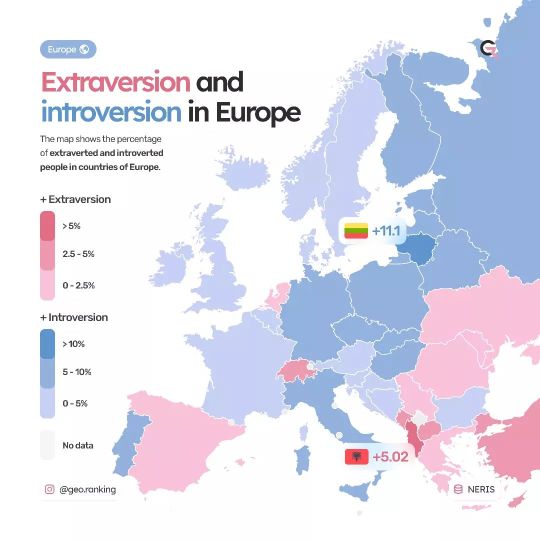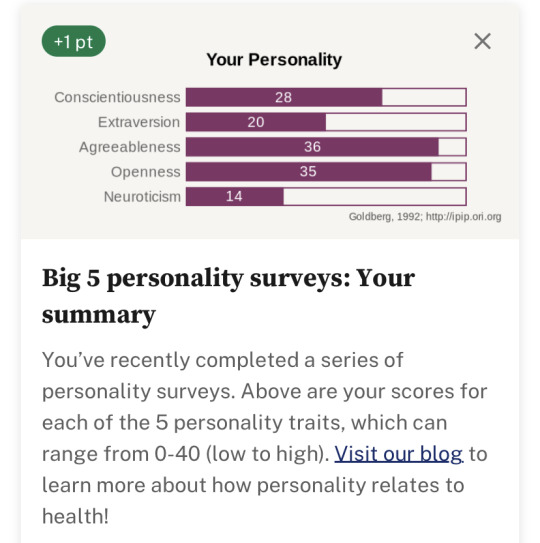#extraversion
Text

The Big 5 Personality Traits: A Framework for Understanding Our Differences
Dive into the Big 5 Personality Traits to gain a better understanding of human personality and individual differences. Discover how characteristics like Openness, Conscientiousness, Extraversion, Agreeableness, and Neuroticism shape who we are and the choices we make in life.
Learn more here!
#psychology#personality#big five#wisdom#mental health#openness#agreeable#relationships#happiness#neuroticism#eq#emotional intelligence#extraversion#introversion#mind
37 notes
·
View notes
Photo

Extraversion VS Introversion in Europe
Percentage of extraverted and introverted people in countries of Europe.
by geo.ranking
415 notes
·
View notes
Text
“The Westerner would take this to mean: “Learn your lesson and repeat it, and then you will be self-liberated.” That, indeed, is precisely what happens with most Western practitioners of yoga. They are very apt to “do” it in an extraverted fashion, oblivious of the inturning of the mind which is the essence of such teachings.”
— C.G. Jung, Volume 11, Psychology and Religion: West and East
33 notes
·
View notes
Text
Ayo!
I just sat for two hours on the windowsill and random people from my uni came by and talked to me. Amazing!

10 notes
·
View notes
Text
"introverts are so stimulated by their own thinking that a roomful of noisy people is just too much for them- it drains their energy."
-susan cain
#introvert#introversion#extravert#extraversion#psychology#susan cain#book quotes#psych#quiet#personality types
8 notes
·
View notes
Text
not introverted or extraverted but another secret third thing
#introverted#introversion#mbti#please help I have been stuck between enfp and infp for over a year#extravert#extraversion
2 notes
·
View notes
Text
nothing throws an extravert off their stride as other extravert befriending them and treating them like they are an introvert
#my extravertish ass: hi#my even more extravertish friend: oh hello poor little one let me hug you you will be my pet my fox see i'm your little prince#me: what.#personall stuff#extraversion
5 notes
·
View notes
Text
Though the impulse to find some universal traits is well intentioned, it may also be hubristic. We can only know our own internal experience, after all, but we still want to project that experience onto others, to feel that their minds reflect our own. Of course, sometimes there are good reasons for deeming other people’s behavior “abnormal,” and asking them to change. The question is where the line is—when another person’s way of living or thinking can be invalidated, and by whom, using what measurements.
The answers people give to that question are inevitably shaped by invisible biases. In the U.S., a solitary nocturnal life might seem more mind-boggling than it would in other countries. On the one hand, it’s an individualistic culture, seemingly primed for people who want to build the life that works for them. On the other, it’s well documented that America is a particularly extrovert-centric nation. The historian Warren Susman called it a “culture of personality,” which glorifies being bold and being seen. From the time Carl Jung described the term extraversion in a popular 1921 book, it became linked in the U.S. to “self-improvement, independence and the go-getting American dream,” according to Fay Bound Alberti, a historian of emotions and the author of A Biography of Loneliness. Introversion, meanwhile, was associated with “loneliness.”
None of this means that social connection isn’t important. But perhaps we shouldn’t be so sure that connection means the same thing to everyone, or that there is any one way to live a fulfilling life.
— The Ultra-Introverts Who Live Nocturnally
#faith hill#the ultra-introverts who live nocturnally#psychology#introversion#extraversion#nocturnality#sociology#personality#usa#warren susman#carl jung#fay bound alberti
2 notes
·
View notes
Text
Saturday. Liber Primus, chapter 3, "On the Service of the Soul"
Saturday. Liber Primus, chapter 3, “On the Service of the Soul”
Carl Jung Depth Psychology Facebook Group
Saturday. Liber Primus, chapter 3, “On the Service of the Soul” (LN, p. 137).
On November 21 Jung had given a presentation to the Zurich Psychoanalytical Society on “Formulations regarding the psychology of the unconscious.”
The minutes report:
At first there was a short explanation of the libido concept.
Psychological phenomena are manifestations of an…

View On WordPress
#Black Books#Carl Jung#Extraversion#Franz Rilkin#Intraversion#Liber Novus#Libido#Religion#Sonu Shamdasani
1 note
·
View note
Text
Personality and Cognitive Quotients: Insights from Psychology
Introduction
The relationship between personality traits and mental abilities has been a central theme in psychology, offering understanding into how individual differences affect behavior and performance. Traditionally, intelligence was narrowly defined as the ability to reason logically, plan systematically, and solve problems quickly – typically measured by IQ tests. Multiple Intelligences Theory by Howard Gardner enlarged this notion by suggesting that there are many types of intelligences such as linguistic, logical-mathematical, spatial, musical, bodily-kinesthetic, interpersonal intrapersonal and naturalistic intelligences among others. This broader perspective points out that intellect is not one thing but a multitude of skills indicative of diverse ways people interact with their environment; thus far research has continued to dwell on these issues as well as relationships between Big Five Personality Traits namely Openness Conscientiousness Extraversion Agreeableness Neuroticism with different dimensions of intelligence also social functioning.
Openness to Experience and Curiosity Quotients
Closely related to openness is curiosity which can be measured using Curiosity Quotient (CQ) that describes an individual’s thirst for information or desire for novelty. According to von Stumm et al., (2011), intellectual curiosity – a major component of Openness has been found to significantly contribute towards academic achievement even beyond traditional cognitive abilities. Such curiosity encourages learners’ deep involvement with content leading higher level cognitive investments while at the same time enhancing creative problem solving skills. In other words it implies those who are open minded not only accept new ideas but also tend explore them more thereby widening their knowledge base and improving various aspects of thinking.This finding suggests therefore that fostering curiosity should be seen as strategy for promoting intellectual growth hence educational institutions should create environments which nurture investigative learning through asking questions.
Agreeableness Social Intelligence (EQ)
Agreeableness is characterized by empathy cooperation trust etc., all these traits have strong relationships with Emotional Intelligence (EQ). For instance Nusbaum and Zuroff (2017) conducted a meta-analysis which showed that higher levels of agreeableness were associated with greater emotional awareness as well better interpersonal skills. This implies that individuals who score highly on Agreeableness are more likely to be good at reading other people’s moods while also being skilled in dealing with them appropriately within social settings – thus this ability may help one succeed both personally professionally. Additionally having such an attribute means being able to understand others’ emotions easily hence it enhances communication abilities thereby promoting conflict resolution.
Research Associations Between Neuroticism, Stress, and Agreeableness
Neuroticism is strongly correlated with stress sensitivity where many studies have shown that people high in neuroticism tend perceive daily events or situations more stressful than those low in neurosis. Moreover, it has been observed that individuals scoring at extreme ends of this trait dimension exhibit different patterns coping style when faced by same stressors; indeed high scorers often respond through negative affectivity such anxiety fear sadness etc., whereas their counterparts express positive feelings like joy excitement happiness. Furthermore apart from heightened reactivity towards negative aspects life due inability regulate emotions properly these individuals also take longer recover from adverse experiences resulting prolonged periods characterized by increased anxiousness along with further maladaptive behaviors aimed reducing stress levels.Research has established close relationship between these two variables so much so
On the other hand, EQ usually correlates negatively with neuroticism. Emotional regulation and awareness necessary for EQ are often compromised at higher levels of Neuroticism. People with high neurotic symptoms may find it difficult to understand or manage their own feelings as well as misinterpret others’ emotional signals hence affecting their social interactions adversely.
Neuroticism and Agreeableness integrated within EQ
It should be noted that when both agreeableness and neuroticism are considered along with each other in relation to emotional intelligence (EI); there can be complex interactions between these two personality traits towards EI. For example; an individual who is highly agreeable as well as very neurotic might have empathy skills on one hand but also fear evaluations or conflicts arising from such relationships due to extreme worry about them being maintained harmoniously thus creating mixed self management abilities where this person has good interpersonal skills but lacks stress coping strategies.
Conclusion
In conclusion, while it is true that agreeableness positively correlates with Emotional Intelligence (EQ) leading better understanding of others’ emotions and more improved relationship building; generally neurosis undermines this concept by making regulation process too complicated thereby impeding ability to cope up with stress among individuals having different levels of these traits. Such understandings are important because they help people design interventions which maximize benefits derived from being highly agreeable while minimizing negative impacts associated with high levels of Neuroticism in various areas like personal growth or professional development programs.However, combination does not always equal so; therefore we should know that there is no neat equation between them but rather a significant interplay between these components which greatly shapes individual’s emotional intelligence profile.
The study into how personality affects cognitive ability measures provides us with insights about human behaviour and potentiality. Such understanding enables educators come up personalized educational plans which cater for diverse personalities alongside intellectual capabilities. By recognizing strengths inherent within each personality type employers can create an environment conducive for optimal job performance while fostering good relations among employees. Ultimately this knowledge equips people to devise more inclusive strategies aimed at personal growth both at social dimensions such as friendship building or self awareness levels.Thus it can be said that the interrelationship between personality and intelligence is critical in our quest for success.
References:
Brackett, M. A., & Mayer, J. D. (2003). Convergent, discriminant, and incremental validity of competing measures of emotional intelligence. Personality and Social Psychology Bulletin, 29(9), 1147-1158. https://doi.org/10.1177/0146167203254596
Fernández-Berrocal, P., & Extremera, N. (2006). Emotional intelligence: A theoretical and empirical review of its first 15 years of history. Psicothema, 18, 7-12. http://www.psicothema.com/pdf/3271.pdf
Lahey, B.B. (2009). Public health significance of neuroticism.American Psychologist,64(4),241-242.doi:10.1037/a0015309
Lopes,P.N., Salovey,P.,Côté,S.,& Beers,M.(2005).Emotion regulation abilities and the quality of social interaction .Emotion ,5(1),113-118.doi:10.1037/1528-3542.5.1.113
Mikolajczak,M., Luminet,O., Leroy,C., & Roy,E.(2007).Psychometric properties of the Trait Emotional Intelligence Questionnaire:Factor structure,reliability construct,and incremental validity in a French-speaking population.Journal of Personality Assessment ,88(3),338-353.doi:10..1080/00223890701333431
Nusbaum,E.C.& Zuroff,D.C.(2017)Relations of the five-factor model of personality with perceived and actual emotional intelligence: A meta-analysis.Personality and Individual Differences,106,223-229.doi:10.1016/j.paid.2016.10.044
Suls,J.,& Martin,R.(2005).The daily life of the garden-variety neurotic: Reactivity, stressor exposure,mood spillover,and maladaptive coping.Journal of Personality ,73(6),1485-1510.doi:10.1111/j.1467-6494.2005.00356.x
von Stumm, S., Hell, B., & Chamorro-Premuzic, T. (2011). The hungry mind:intellectual curiosity is the third pillar of academic performance.Perspectives on Psychological Science , 6(6),574-588.doi:10.1177/1745691611421204

#PsychCommunity#PsychoEducation#MentalHealthAwareness#PsychologyResearch#EvidenceBased#StressManagement#CopingStrategies#MentalWellness#EQ`#`EmotionRegulation`#SocialSkills`#self awareness#Extraversion#Openness#Neuroticism#Agreeableness#Conscientiousness#big 5#PersonalityTraits
0 notes
Text
I Am An Introvert
Poem about my journey through life as an introvert. Here is the content:
I am an introvert
And have always been
Even if you haven’t seen
When it cometh to social interaction
I ain’t no expert
Because, full am I, of tension
As I know not, what to say
And what not to say
I am an introvert
Earlier, I used to think
That it was a bad thing
Because I was always told
That I needed to talk…
View On WordPress
#Extraversion#Extroverts#Intraversion#Introverts#personality#shyness#social anxiety#social awkwardness#Social Interaction
0 notes
Photo

Extraverted and introverted people in Europe.
by geo.ranking
212 notes
·
View notes
Text
youtube
#profil#empathique#travaillomane#persévérant#promoteur#réveur#rebelle#personnalité#ouverture#conscience#extraversion#agréabilité#névrosisme#Youtube
0 notes
Text
I know there was this joke going around that us introverts have no problem with social distancing.
But now introvert culture has become extrovertive. How, you may ask?
ADS
I be watching YT and at least three ads pop up in a 1 hr tarot video. Like “The tower indicates-”
BUY CHEETOS TODAY
Like an extrovert saying hi to you when you are trying to listen to music and read.
0 notes
Text
Evidation: My Big 5 Personality Survey Results!
My (former) friend got me onto this app that gives you $10 for 10,000 points that you can turn into money (or donations). This is in exchange for your input for medical studies. You can also tie this to other health apps for extra points!

Before we get any further, I would suggest downloading the app: https://apps.apple.com/us/app/evidation-reward-health/id793039965
This app actually has a lot of perks, so I am shocked as I am writing this how this has not been a tumblr blog sooner. And yet, I will let you discover the multitude of joys on this app. What I am here to talk about is me!
Recently, a couple of personality tests came up for the following areas of one’s personality:
Conscientiousness: Organization, Productiveness, Responsibility
Extraversion: Sociability, Assertiveness, Opposite of Introversion
Agreeableness: Compassion, Respectfulness, Trust in Others
Openness: Intellectual Curiosity, Creative Imagination
Neuroticism: Anxiety and Depression Tendencies
So, part of why I started this blog that has turned into gaming and marketing experimentation was so that one could read my blog and get to know me. So, what are my numbers?

Numbers are just numbers right? Let’s attach some explanation to them:
Conscientiousness (28): Those with high levels of conscientiousness tend to work hard to achieve their goals and complete tasks they’ve started. They also tend to get higher grades in school and perform better in many jobs, but are more likely to experience perfectionism and fear of failure.
Extraversion (20): Those with low levels of extraversion tend to be less social or outgoing. They think carefully before speaking, enjoy time alone or with a few close friends, and are less likely to take part in thrill-seeking activities. If you’re low in extraversion, you may want to focus on keeping up your relationships. Research has found that social relationships may be just as important for a long and healthy life as not smoking, and even more important than being physically active!
Agreeableness (36): Those with high levels of agreeableness tend to be considerate and polite in social interactions. They prefer to resolve conflict by working together or letting things go, and find it easy to trust people and feel compassion towards others. Being higher in agreeableness may relate to a lower likelihood of engaging in risky behaviors, such as drunk driving. You may also be more likely to engage in healthy coping strategies when you’re stressed, such as seeking social support or reframing a stressful situation positively.
Openness (35): Those with high levels of openness are generally open to new activities and ideas. They tend to be creative, curious, and sensitive to art and beauty. If you’re high in openness, and thus enjoy exploring new activities and ideas, you may be more motivated to stick with a varied physical activity schedule than a familiar routine.
Neuroticism (14): Those with low levels of neuroticism may be less likely to experience negative emotions, and might tend to experience more balanced feelings and reactions during stressful situations. Low scorers may also experience a lot of optimism and resilience. Some research suggests that individuals who are low in neuroticism may be less likely to seek medical attention when experiencing symptoms. Make sure you keep up with your doctors’ appointments and have a healthcare provider investigate any new symptoms you may be experiencing.
So, let’s resay this in basic English:
I am a hardworking perfectionist. I don’t keep up with a lot of people but the ones I do keep up with, I am a party and a half. If I don’t know you like that you would not believe it. I am very polite and respectful, and have often been called “The Peace Keeper”. I am great in conversation for having an open mind and love a bit of variety. I work hard to be a positive person, but there are times I don’t worry enough about things.
This is pretty on point. I love this as a self assessment, compared to doing one based on astrology or something more complicated like Meyers Brigg test. Where do you think you would score on each? Have you downloaded the app yet?
#evidation#smart phone#health#apple#personality#conscientiousness#organization#productiveness#responsibility#extraversion#sociability#assertiveness#introversion#rant#about me#agreeableness#compassion#respectfulness#trust#opennes#intellectual curiosity#creative imagination#neuroticism#anxiety#depression#data#medical
1 note
·
View note
Text
Understanding MBTI: A Deep Dive into Personality Types
The Myers-Briggs Type Indicator (MBTI) is a widely recognized and respected psychological tool that helps people understand their personality types. Developed by Katharine Cook Briggs and her daughter Isabel Briggs Myers, MBTI is based on the theories of Swiss psychiatrist Carl Jung. It has been used for decades to help people gain insights into their preferences, strengths, and weaknesses, as…

View On WordPress
#Communication#Extraversion#Feeling#Introversion#Intuition#Judging#MBTI#MyersBriggs#Perceiving#PersonalGrowth#PersonalityTypes#Psychology#Relationships#SelfDiscovery#Sensing#Thinking
0 notes